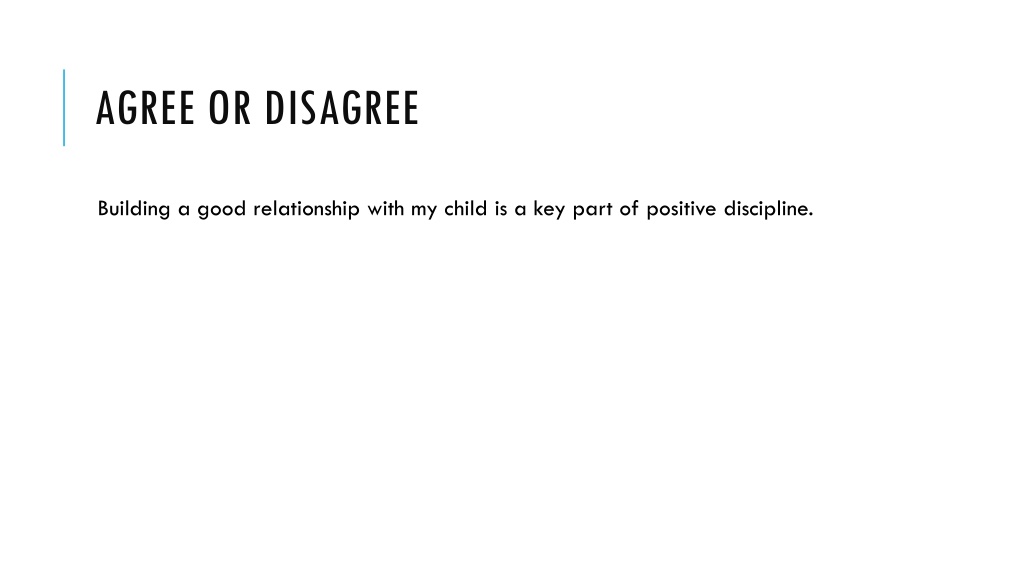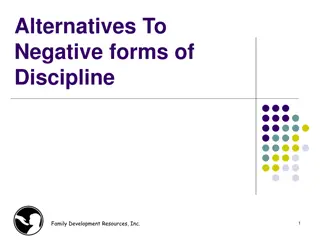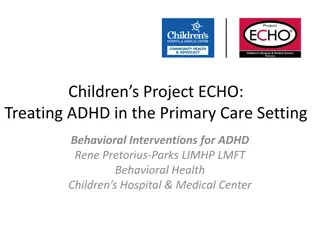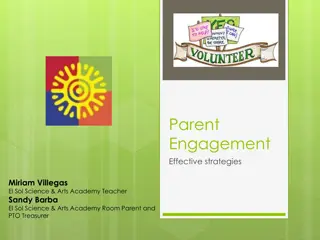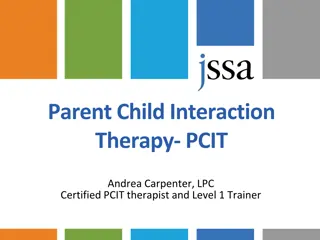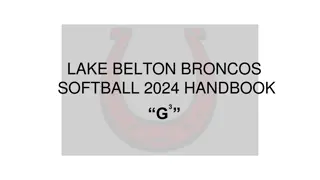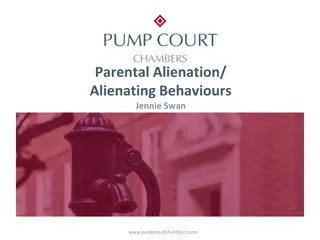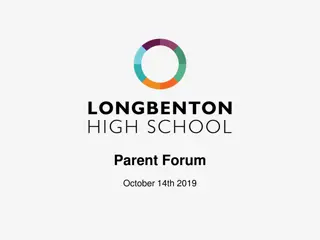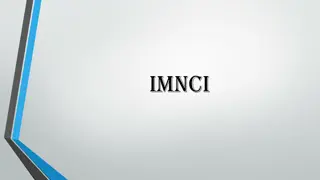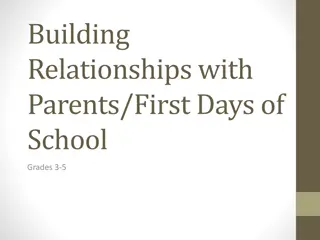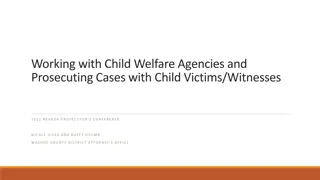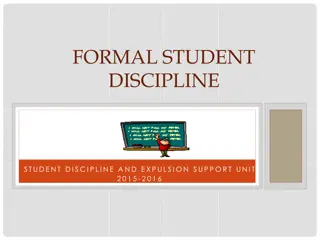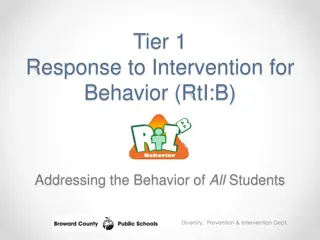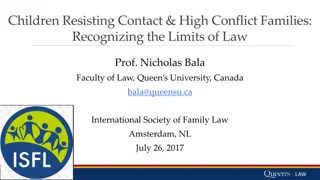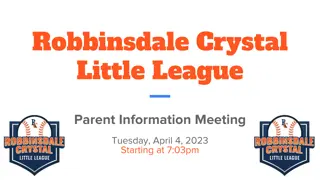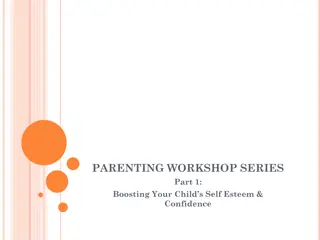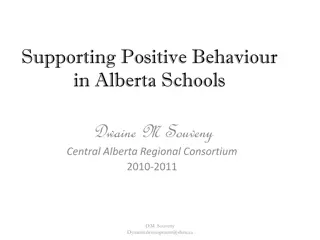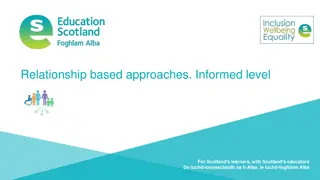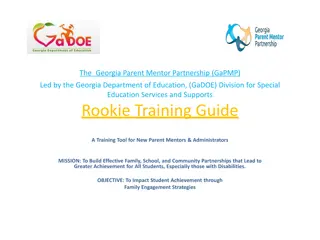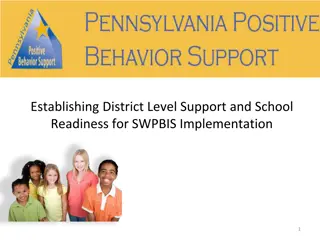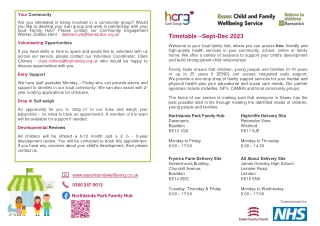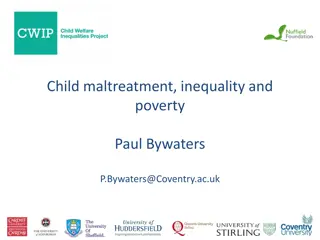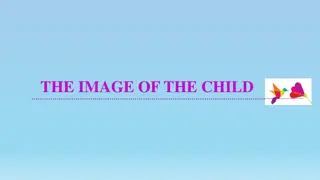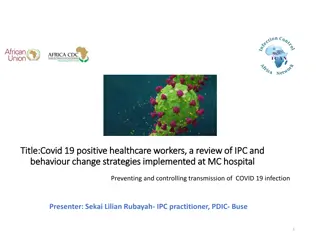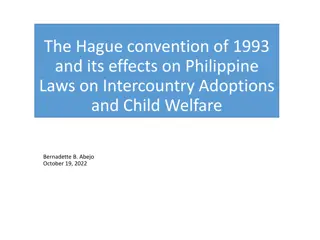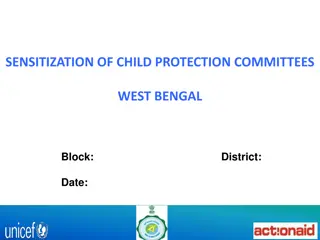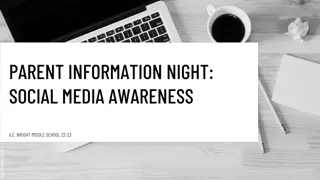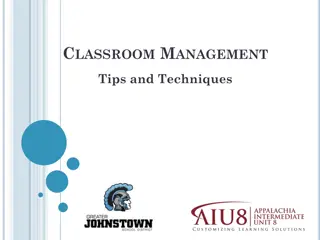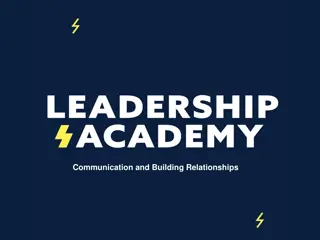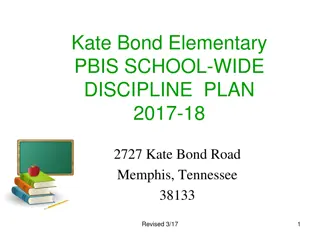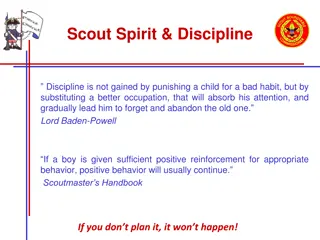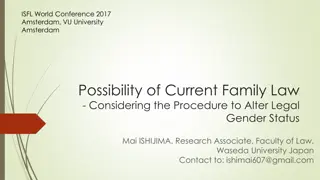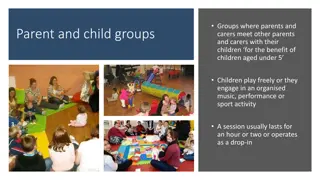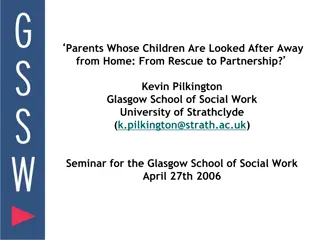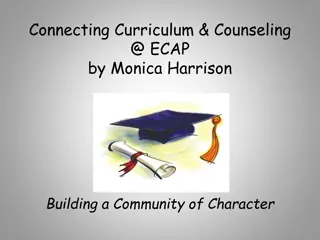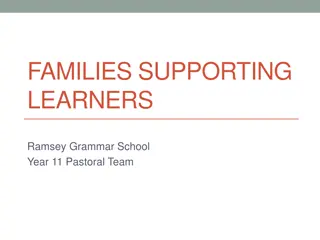Positive Discipline Strategies for Building a Strong Parent-Child Relationship
Developing a positive relationship with your child is crucial for effective discipline. It involves catching them being good, setting clear expectations, childproofing the environment, and using positive reinforcement rather than physical punishment. Understanding the difference between discipline and punishment is key to guiding children in the right direction.
Download Presentation

Please find below an Image/Link to download the presentation.
The content on the website is provided AS IS for your information and personal use only. It may not be sold, licensed, or shared on other websites without obtaining consent from the author. Download presentation by click this link. If you encounter any issues during the download, it is possible that the publisher has removed the file from their server.
E N D
Presentation Transcript
AGREE OR DISAGREE Building a good relationship with my child is a key part of positive discipline.
AGREE OR DISAGREE It is very important to catch my child being good.
AGREE OR DISAGREE There is a time and a place for everything, including spanking a child.
AGREE OR DISAGREE When I see my young child getting ready to do something he s not supposed to do, the best thing I can do is distract him.
AGREE OR DISAGREE Parents should childproof their homes so children will not get into things they are supposed to leave alone.
AGREE OR DISAGREE The more rules I can establish, the better.
AGREE OR DISAGREE My child should know what I expect from him without me saying.
AGREE OR DISAGREE In certain cases, mild physical punishment (example spanking, swat on the back) can be an effective way to discipline children in
DISCIPLINE VS. PUNISHMENT On a blank piece of paper write down/explain what you think the difference between punishment and discipline are?
DISCIPLINE Discipline means to teach and guide Effective discipline helps children learn to control their behavior so that they act according to their ideas of what are right and wrong NOT because they fear punishment Example: they are honest because it is wrong to be dishonest NOT because they are afraid of getting caught Discipline can be a reaction to both good and bad behavior Positive Discipline When you praise your child for doing good things Example: When you thank your child for picking up her toys or when you compliment your child for remembering to wash his hands after using the bathroom
PUNISHMENT IT is a reaction to bad behavior The purpose of purpose of punishment is to stop a child from doing what you don t want and using a painful or unpleasant method to stop Types of Punishment physical punishment - slapping, spanking, switching, paddling, and using a belt or hair brush. verbal punishment - shaming, ridiculing, using cruel words, saying I don t love you. withholding rewards - You can t watch TV if you don t do your homework. penalties - You broke the window so you will have to pay for it with money from your allowance.
Reflect on their childhood experiences with physical punishment: What types of things did you do to be punished? How were you punished? How did it make you feel? Did you ever repeat the behavior? Why or why not? Do you plan to discipline your children the same way? Why or why not?
DISCIPLINE OR PUNISHMENT Effective Discipline Helps the child learn self-control Can be used with teenagers Builds the child s self-esteem Sets a good example of effective ways to solve problems Physical and Verbal Punishment Teaches the child to deceive parents Won t work with teenagers Tears down self-esteem Teaches the child that violence is an acceptable way to solve problems
WHAT WORKS? What are some ways parents can effectively discipline their children?
CONSEQUENCES The purpose of using consequences is to help the child learn to make decisions and to be responsible for his own behavior. Consequences are learning experiences, not punishment. Parents should tell the child, before it happens, what the consequences are for breaking a rule. The child also needs to know the reason for the consequence
CONSEQUENCES Natural Consequences Allow children to learn from the natural order of the world The parent allows unpleasant but natural consequences to happen when a child does not act in a desirable way For example, If he/she doesn t do his homework, he will get a low grade. Cannot use if the safety of health and child are involved Logical Consequences arranged by parents and must logically follow the child s behavior For example, if he/she doesn t do homework they can t go out to the movies that night until they finish it
Kristin left her dirty clothes on the floor and never placed them in the dirty clothes bag as mother requested. Nagging, scolding, and threatening did no good. Kristin continued to leave her dirty clothes on the floor. Mother decided to use logical consequences. She told Kristin, in a firm and friendly voice, that in the future she would wash only clothes that were placed in the bag. After five days, Kristin had no clean clothes to wear to school and she was very unhappy to have to wear dirty, rumpled clothes. After that, Kristin remembered to place her clothes in the bag. Kristin s mother gave her the responsibility for placing her clothes in the proper place to be washed. If mother had relented and washed Kristin s clothes when she had not placed them in the bag, she would have deprived her of an opportunity to learn to take responsibility for herself. If parents protect children from the consequences of their behavior, they will not change their behavior. Some parents would not be willing for their child to go to school in dirty, rumpled clothes. Using consequences can help a child develop a sense of accountability. It leads to warmer relationships between parents and children and to fewer conflicts. The situation itself provides the lesson to the child
1. Your son will not stop climbing furniture and it is getting dangerous. You need him to stop doing it in case he gets hurt. 2. Your daughter refuses to eat her food. Everything you try is met with "no". 3. Your son gets very upset in the supermarket and starts screaming and throwing a fit. You very much need to finish your shopping so you don't want to leave. 4. Your daughter keeps kicking and hitting other kids in her playgroup. 5. Your son keeps saying curse words that he learned from his peers. 6. Your daughter refuses to do her homework. Even though you don't believe in grades, you don't want her to fail the fourth grade.
TO SPANK OR NOT TO SPANK http://parentadvice.net/the-pros-and-cons-of-spanking-your-child/
JOURNAL 1. Do you think using mild punishment (like spanking) can be effective in some cases for disciplining children? Explain your reasoning. 2. List and explain 3 guidelines for yourself on how you will discipline your child when you are a parent.
